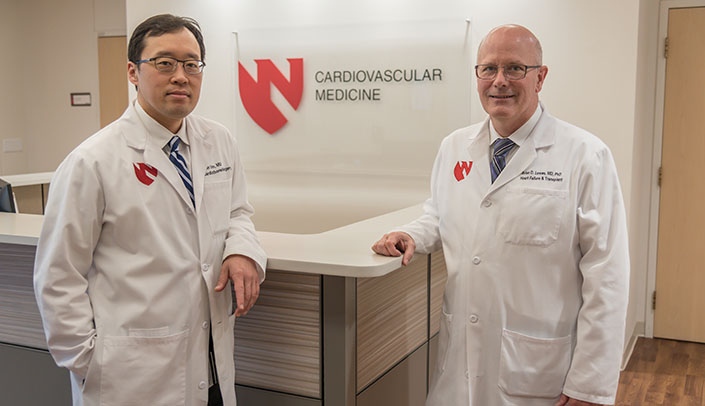The University of Nebraska Medical Center and its hospital partner, Nebraska Medicine, were part of a major study that determined a new heart pump is an improvement over previous models, and perhaps as good as a heart transplant itself. These pumps are now available at the med center.
The study's results have been published in a recent edition of The New England Journal of Medicine, with two UNMC faculty, Brian Lowes, M.D., Ph.D., Angle Presidential Chair of Cardiology, and John Um, M.D., surgical director of cardiac transplantation and mechanical circulatory support programs, as contributing authors.
The new magnetically levitated centrifugal-flow device is smaller than previous models, "about half the size of an average person's fist," Dr. Um said.
"Historically, these pumps have not been perfect," Dr. Lowes said. "Limitations existed, such as clotting off, stroke, or bleeding complications, because of anti-coagulation."
So the search was on to build a better heart pump — and the study results suggest clinician-scientists may have found it.
The study lasted for several years and included more than 1,000 patients nationwide. With more than 60 enrollees, UNMC/Nebraska Medicine was one of the study's top sites.
"We help pioneer these therapies," Dr. Lowes said. "We're one of the leading centers in the country, which means the world."
These new pumps not only performed better, but also lasted longer — which in itself is another huge improvement.
"When I first started, these pumps would last maybe 18 months," Dr. Um said. Then, they would have to be replaced, and, "each time, it gets harder not only for the surgeon but for the patient."
The fewer procedures, the better.
A left ventricular assist device (LVAD) can be just what the doctor ordered for a patient who can't get a transplant, for whatever reason. And the results of this study, "are approaching what we see with a transplant," Dr. Lowes said.
"We'll probably see more and more patients choosing the new heart pump as an option."
Dr. Um is grateful to those who chose to be part of the clinical research trial.
"A lot of these patients, they're pretty scared," he said. "They're looking at their own mortality. We're throwing a lot of terms at them. When we're talking about a new device, a lot of people get overwhelmed.
"But people want to be part of medical research, and it's a wonderful thing."
In this case, it resulted in an advance.
"Many of these patients will probably be able to live out their lives with a mechanical heart," Dr. Lowes said.
We are Nebraska Medicine and UNMC. Our mission is to lead the world in transforming lives to create a healthy future for all individuals and communities through premier educational programs, innovative research and extraordinary patient care.
Twitter | Facebook | Instagram | YouTube | Flickr
UNMC study: New heart pump improves on previous models
- Written by Kalani Simpson
- Published Jun 12, 2019

Left: John Um, M.D., surgical director of cardiac transplantation and mechanical circulatory support programs and Brian Lowes, M.D., Ph.D., Angle Presidential Chair of Cardiology
Media Contact
Vicky Cerino
UNMC Strategic Communications
(402) 559-5190
(402) 559-4353
vcerino@unmc.edu